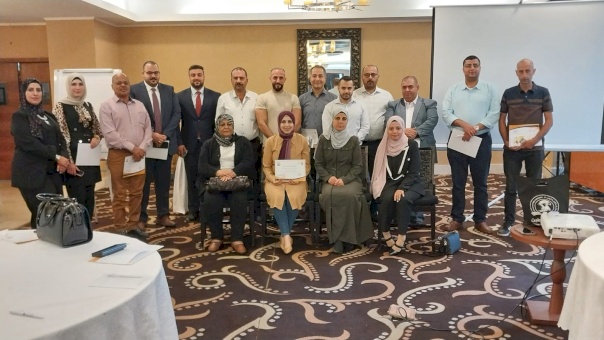
With the participation of more than 40 members and legal advisors over three days,
AMAN and Anti-Corruption Commission conclude a training session for 17 local government units
Ramallah – In partnership with the Palestinian Anti-Corruption Commission (PACC), the Coalition for Accountability and Integrity (AMAN) concluded a three-day intensive training for legal advisors and members of 17 local government units (LGUs) from across the West Bank governorates. Addressing anti-corruption measures, the training event sought to introduce regulations in support of the fight against corruption and to review LGU-related guidance manuals published by AMAN.
The training course brought together a total of 17 LGUs from northern, central, and southern West Bank. These included the municipalities of Tulkarem, Ramallah, El-Bireh, Beituniya, Hebron, Bethlehem, Beit Sahur, Halhul, Jericho, Qalqiliya, Abu Dis, Ar-Ram, Dura, Az-Za’ayyem, Yatta, As-Sawahira Ash-Sharqiya, and Salfit.
In her opening statement, Ms. Intesar Hamdan, Director of Awareness Raising and Community Outreach at AMAN, welcomed the audience and appreciated their arrival from various areas in the midst of closure and extraordinary situation on the ground, which further constrained movement across Palestinian governorates. In spite of all these exceptional conditions, the organisation of the training event conveys a message of perseverance and unremitting insistence on life. It also reflects part of the national responsibility of AMAN.
Hamdan made clear that AMAN had undertaken and published in-depth research, studies, and guidance manuals on LGUs. These contribute to immunising LGUs against corruption and strengthening the values of integrity, principles of transparency, and systems of accountability within LGUs.
According to Hamdan, AMAN has made diligent efforts to promote best practice in LGU functions with a view to serving the public interest and putting citizens first. These have enabled LGUs to carry out their duties and deliver their mission of local community service in line with the standards of good governance. Hamdan highlighted that, as a Palestinian anti-corruption think tank, “AMAN continues to stand ready and collaborate with LGUs in developing regulations and manuals and sharing experiences.” This should contribute to building municipalities that take part in the fight against corruption, exercise integrity, and adopt the principles of governance.
Ms. Dalia Ubeid, Director of Training and Preventive Education at AMAN, asserted that the training event was held in the context of the Strategic Plan for Strengthening Integrity and Fight against Corruption, which seeks to immunise the staff of public institutions against suspicions of corruption. To this avail, these staff have acquired the knowledge and tools needed to ensure impartial and high quality public service provision that befits Palestinian citizens. Ubeid indicated that a total of 450 staff members of public institutions and newly elected heads and members of municipalities have benefited from the education programme. She also highlighted the joint efforts made by AMAN and the Ministry of Local Government to compile the Code of Ethical Conduct, which is expected shortly.
Ubeid stressed the importance of compliance with the Regulation on the Disclosure of Conflicts of Interest and Regulation on the Acceptance of Gifts as preventive measures and tools for promoting integrity and fighting corruption in the local government sector.
During the first training day, Ms. Nour Malhis, Director of the PACC Special Investigation Department, presented on the concept, forms, causes, and consequences of corruption. Malhis elaborated on the PACC role, mandate, complaint procedures, and reporting process. Mr. Ahmed al-Atrash, Head of the PACC Studies and Research Section, reviewed a number of regulations in support of the fight against corruption, including the Regulation on the Disclosure of Conflicts of Interest No. 1 of 2020, Regulation on the Acceptance of Gifts, and financial declarations.
Delivered by Mr. Mu’ayyad Afaneh, a trainer, the second training day featured a presentation on a number of AMAN’s guidance manuals for LGUs. These included the Policy and Procedure Manual for Strategic Planning, Procedure Manual for Internal Control and Audit within Local Government Units, and Guidance Manual for the Preparation of Municipal Estimated Budgets and Citizens Budget.
Led by Dr. Abdul Rahim Taha, a legal expert, the third training day provided an in-depth legal background of LGU operations from a legal, regulatory, and administrative perspective. Taha continued to present on AMAN’s guidance manuals, including the Procedure Manual for Complaints, Procedure Manual for Tenders, and Policy and Procedure Manual for the Strategy of Communications between Municipalities, Citizens, Local Communities, and Media Outlets.
The training session involved a lively debate, interactive dialogue, exercises, and case studies. LGU members shared many inspiring experiences of relevance to the topics under discussion. Participants also commended the content of the training course, emphasising that it bridged significant gaps in knowledge and understanding of good governance and concepts of fight against corruption at the level of LGUs.
At the closing of the training session, the over 40 participants were honoured. All participants were unanimous in stressing the importance of concerted institutional efforts towards a society free from corruption.
